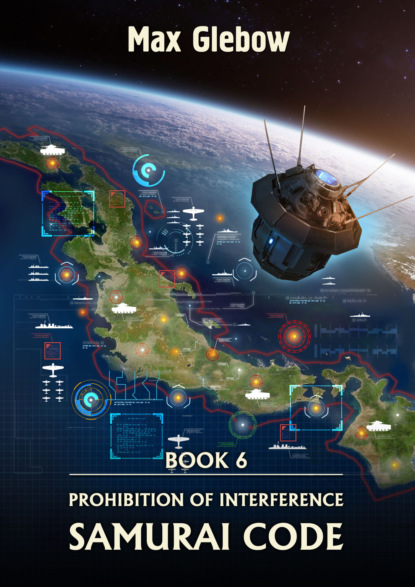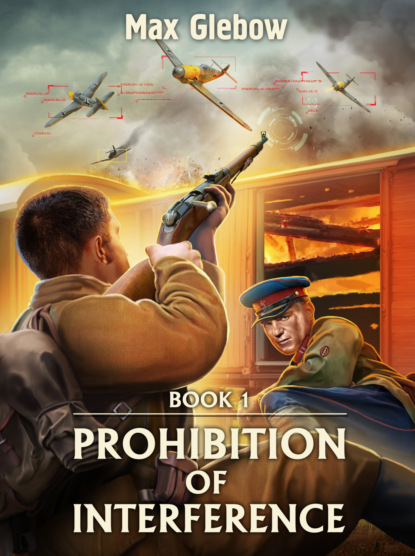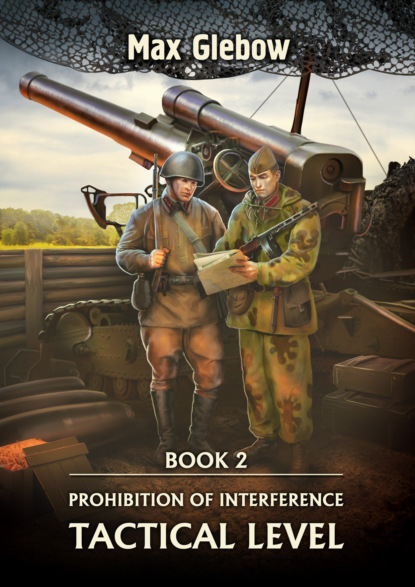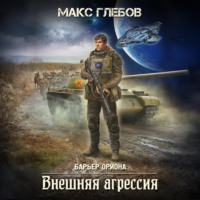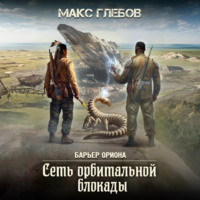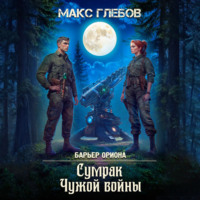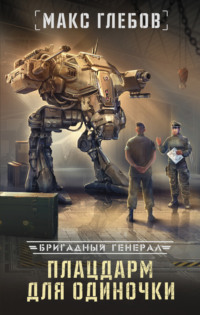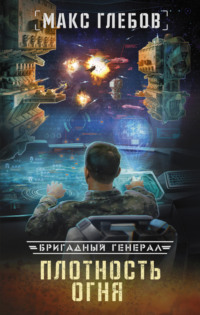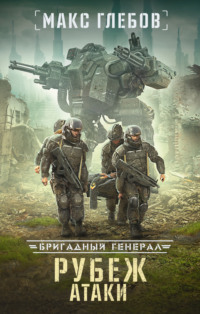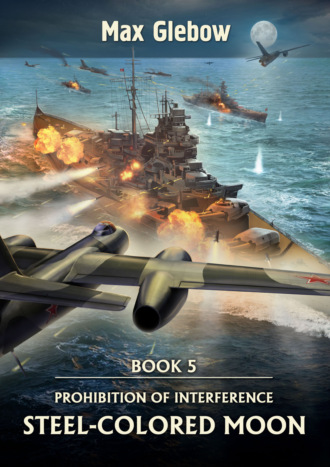
Полная версия
Prohibition of Interference. Book 5. Steel-colored Moon
The Chief gave me a sharp look in the eye, and I didn't want to disappoint him.
“I'm ready, Comrade Stalin, give the order.”
“In the operation to break the blockade of Leningrad you, Comrade Nagulin, showed yourself a competent commander, capable of organizing a breakthrough of the enemy's defense and ensuring the unimpeded entry of the shock army into it. Of course, the Volkhov and Leningrad fronts did not achieve everything that was planned, but it is still a very great victory. Your success has been noted by the Headquarters of the Supreme High Command, and now it's time to repeat it under different conditions and on a somewhat larger scale. You're right, we're not ready for a really big offensive, but we have another enemy besieged city. It is an important city that must not be given to the Germans under any circumstances. The Headquarters of the Supreme High Command give you three days to complete your current business in Moscow. We know that you are supervising the work on a new turbojet engine for our aviation, and this work should by no means stop after you leave. But only three days! And then you're flying to the Crimean front as a representative of the Headquarters of the Supreme High Command[2]. Sevastopol needed to be unblocked, and Lieutenant-General Kozlov was never able to build on the initial success of the Kerch-Feodosiya landing. Manstein is outplaying him on all directions, and this situation must be fundamentally changed. If necessary, you can remove Kozlov from the command of the front – you will have the appropriate authority, but to do it or not, you will decide on the spot.”
Chapter 3
Erich von Manstein was well aware that together with his 11th Army he found himself on the periphery of the maelstrom of events that in a matter of months changed the entire course of military action on the Eastern Front. He began the war against the Soviet Union as part of Army Group North, commanding the 56th Motorized Corps, which invaded the Baltics. In the first week of fighting his corps crossed more than 200 kilometers and came to the Western Dvina, where it successfully repulsed a tank counterstrike by Soviet troops.
It seemed that the war was developing quite favorably, and Manstein even had the thought that Hitler was right, and before winter Red Army would be completely defeated, but already at the beginning of July his corps suffered a serious defeat at the hands of Lieutenant-General Morozov's army near Soltsy. Two groups of Soviet troops, supported by more than two hundred planes, encircled the Wehrmacht's 8th Panzer Division from the north and south, and it had to fight for some time in an encirclement. The Third Panzer Division was also in danger of having its communications intercepted.
That time Manstein managed to avoid a defeat. The SS Division "Dead Head" was given to him to restore the situation, and at the cost of heavy losses the 8th Panzer Division was unblocked, after which it had to be sent to the rear to be re-formed. The German troops were pushed back 40 kilometers, and the offensive of the Army Group North in Leningrad stalled for almost a month. It was then, at Soltsy, that Manstein first began to think seriously about the fact that things might not be as simple with this war as many German generals and politicians would have liked.
Then there were battles at Demiansk, and finally, in September 1941, Manstein was given command of the 11th Army, which by early November seized almost the entire Crimea and besieged Sevastopol.
While dealing with the problems of his own army, Manstein nevertheless closely monitored the situation on other fronts. The alarm bells started ringing as early as September, but they were barely audible then behind the roar of victory fanfares.
The Russians suffered a spectacular defeat at Kiev. Bryansk and Vyazma were next, but then something went wrong in the Wehrmacht machine, which was moving steadily eastward, to the point that it began to have a direct effect on the 11th Army, which did not seem to have directly related to the battle for Moscow.
At first the November attempt to capture Sevastopol failed. Manstein underestimated the power of the coastal batteries covering the city, and when a hundred and fifty heavy guns of the Sevastopol forts were joined by the volleys of the main guns of two cruisers and the battleship Paris Commune, which had come to the aid of the besieged city, he gave the order to stop the assault because of its obvious futility.
Manstein was deservedly considered one of the best strategists of the Wehrmacht. It was he who in 1940 proposed the plan to invade France with a tank strike through the Ardennes Mountains. Having crossed the Ardennes, the tanks were to cross the Meuse and, without waiting for infantry, reach the English Channel coast in a wide arc, cutting off the enemy's northern grouping. The German military command considered Manstein's plan too risky, but it was unexpectedly supported by Hitler, who categorically did not like the fact that the generals were offering him, in fact, to repeat Alfred von Schlieffen's plan, which the Germans had implemented at the beginning of World War I. Hitler, quite rightly, believed that the French and the British were expecting just that, and that the Wehrmacht would not be able to achieve any surprise. Manstein's proposal came just in time, and the Führer insisted on adopting his plan, which eventually led the Wehrmacht to such an impressive victory.
However, the talent of a strategist was not Manstein's only advantage. He was also a consummate specialist in squeezing reserves out of the command. No one else could so convincingly and persuasively explain to his superiors that he was the one who needed tanks, planes, infantry, and artillery more than anyone else now, and that if he was not given them, then, depending on the particular circumstances, either there will be a universal catastrophe or the Wehrmacht will miss the great victory, which he, Erich von Manstein, almost already has in his hands.
And now this tried and tested mechanism has begun to malfunction. The commander of Army Group South, Gerd von Runstedt, flatly refused to reinforce the 11th Army with tanks and aircraft, citing the fact that the grand battle for Moscow sucked out all the reserves, and he had already been stripped of too many divisions. The only thing Manstein was not denied was artillery. 200 batteries of heavy guns were placed at the disposal of the 11th Army. For the most part these were conventional large-caliber field howitzers, including 210-millimeter ones, but heavier artillery systems surviving from World War I came from Germany as well. Against their background, the Karl-Gerät self-propelled mortars with their caliber of 600 millimeters and the unique 800-millimeter railroad gun Dora, with its 7-ton shells, 32-meter barrel, and 250-man crew were perceived as real miracle weapons.
And still the assault failed. At the most crucial moment the Russians landed sea-borne troops in the rear of the 11th Army, they brazenly stormed the port of Feodosiya and landed the troops from the warships directly onto the piers. The 46th Infantry Division and the Romanian Mountain Rifle Regiment tried to halt the advance of the landing troops, but they were cut off at the Kerch Peninsula and almost completely destroyed.
The assault on Sevastopol had to be stopped in order to rush infantry and artillery to Feodosia. It proved extremely difficult to do this on icy roads, but the Russian forces were not limitless, and by mid-January the situation had stabilized. The Red Army continued to hold Feodosia, but was unable to move further west.
When the news came in early December that Army Group Center had been encircled near Moscow that shook everyone, Manstein realized that he would not wait for any more reserves. Nevertheless, the order to take Sevastopol by storm was still in force, and Manstein had to make do with the available resources in a rapidly deteriorating situation.
Manstein understood that there was no point in resuming an assault on the city while a strong group of Soviet troops was in his rear. He left a covering force at Sevastopol and concentrated his main forces against the Russian armies, which were entrenched on the Kerch Peninsula and constantly tried to break through from there into the interior of Crimea.
The Führer's order to begin using chemical weapons against the Red Army did not please Manstein. As a military strategist, he understood Hitler's motives – the Army Group Center, sitting in the Moscow Pocket, had to be saved by any means. Nevertheless, he did not expect a long-term effect from the use of chemical warfare agents. The civilian populations of Russian cities could indeed become very unhappy, but Manstein strongly doubted that chemical munitions would be more effective at the front than conventional shells and bombs.
Near Moscow, mustard gas was already flowing and clouds of phosgene and cyanogen chloride were swirling over Russian positions, while in the Crimea, both sides were in no hurry to throw chemical shells at each other.
Manstein had had his fill of this stuff during World War I, and did not seek to repeat that unpleasant experience, and the Soviets, who were not subjected to chemical attacks, were not the first to use poisonous substances either.
Stocks of shells and bombs with colorful rings on their casings had just been piling up in the front depots, and then went back to the Reich when, in late January, the Führer suddenly changed his mind and ordered the cessation of the use of chemical weapons.
The winter in Crimea was unexpectedly cold. Of course, the freezing temperatures here could not be compared to what was going on at Moscow and Leningrad, but the roads were first icy and then muddy, which made it very difficult to move the troops. And yet now, in mid-March, Manstein felt that he could not drag it out any longer. The problem of Feodosia and Kerch should have been solved immediately. The battle of Moscow ended in heavy defeat, but the front was stabilized, and the Führer finally remembered that there were other battlegrounds. After long arguments Manstein still managed to convince the command to allocate a tank division armed with new long-barrel cannons capable of penetrating the armor of Russian T-34s and KVs from a reasonable distance to strike the Kerch Peninsula. In addition, Colonel General Richthofen's Fourth Air Fleet was to support his offensive from the air. Manstein understood that this was the maximum he could get, and Hitler's best strategist no longer doubted – it was time to start.
* * *Stalin did not let me go to the Crimea alone. Well, who would have doubted it. The Army Commissar 1st Rank, Lev Zakharovitch Mekhlis, went with me as the Chief's watchful eye, and, interestingly enough, also as a representative of the Headquarters of the Supreme High Command. Considering that the rank of my "colleague" corresponded to that of the General of the Army, I had great suspicion that my decisions would be challenged all the time by this comrade, who was very active and unconditionally loyal to Stalin, and who had very little knowledge of military matters.
From the very beginning Mekhlis looked at me with almost undisguised suspicion; he only kept his caustic remarks to himself, it seemed, because of the direct order from the Supreme Commander-in-Chief. But that was while we were in Moscow. The farther our plane moved from the capital, the clearer was the mixture of disdain and mistrust in the Army Commissar's glances he cast at me. I completely ignored these glances of his and behaved in an emphatically neutral manner.
Mekhlis finally couldn't stand it. “You are not a member of the Party, are you, Major General?”
“I am not,” I replied, as indifferently as possible.
“Is this your position of principle?”
“I would not say so. Rather, there are objective circumstances that prevent…”
“It's all excuses,” Mekhlis cleaved the air with his hand, reinforcing the categorical tone of his words, “I read your profile. You are hiding behind religious beliefs, even though you know very well that this is complete nonsense.”
“Lev Zakharovitch, unfortunately, my point of view on this issue does not coincide with yours.”
“Be kind enough to address me according to regulations, Major General. You are three ranks below me, and it is strange to me that I should have to teach you the chain of command.”
“My fault, Comrade Army Commissar 1st Rank. It won't happen again.”
I answered calmly and even indifferently, and that seemed to infuriate the impulsive Commissar the most.
“Comrade Stalin has placed a high degree of trust in you, Major General,” Mekhlis's voice sounded threatening, “But that doesn't mean that now everyone around you will instantly let their guard down.”
“That's right, Comrade Army Commissar 1st Rank,” I answered with the same indifference, “Loss of vigilance is a direct path to bigger problems. It must not be lost under any circumstances. If you'll excuse me, the last three days have been very stressful, and you and I will have a lot of urgent work to do once we get there. With your permission, I'll get some sleep.”
I made myself comfortable in my chair and closed my eyes, completely ignoring Mekhlis's face, which was twisted with anger. The funny thing was that neither I nor the Commissar could figure out which one of us should obey whom. Comrade Stalin was always an extremely cunning bug; he masterfully knew how to plant potential conflict bombs under relations between his subordinates. Didn't he know Mekhlis's character well? I don't believe it! Rather the opposite. Stalin was well aware of what our joint mission to the Crimean front would entail, and he evidently sincerely believed that it would only be better for the cause.
Mekhlis did outrank me by quite a bit, but it was I, not the Commissar, who received the authority to make personnel decisions regarding the leadership of the Crimean Front. Stalin also explicitly recommended Mekhlis not to interfere in my military-strategic decisions, leaving him with disciplinary matters, moral-political preparation of the operation and some general control over its course, whose essence I could not fully grasp, and the Chief himself did not elaborate on his idea.
All in all, it turned out to be a pretty good jar of spiders, and in addition to purely military matters, I clearly had a lot of problems to deal with in the near future due to the manic suspicion and unparalleled mistrustfulness of the Army Commissar. But I don't care! The trouble to come was to be met as it came. I activated the augmented reality mode and unfolded a virtual map of the Crimean peninsula before my eyes.
The picture that emerged was, to put it bluntly, contradictory. At first glance, the Red Army and the Black Sea Fleet had considerable forces in the Crimea. On the Kerch Peninsula the 44th, 47th and 51st Armies were concentrated, having in their composition nearly 250,000 infantry, six tank brigades, and two separate tank battalions. The garrison of the Sevastopol defensive area had about 120,000 soldiers and commanders, numerous artillery, including coastal batteries of large caliber, 47 tanks, and more than a hundred aircraft, based at the airfield built at the beginning of the war on Cape Chersonesos. The Black Sea Fleet had the battleship Paris Commune, the cruisers Krasny Krym and Krasny Kavkaz, three destroyer battalions, two light cruisers, a fairly impressive underwater force and a significant number of minesweepers, small artillery ships and boats.
These seemed to be impressive forces, but there were some serious "buts". First of all, of course, aviation. This misfortune had only worsened by early 1942. The losses of the initial period of the war also affected the Red Army Air Forces and, no less importantly, the quality of pilot training. Too many experienced pilots died in the first six months of the war, and it was not easy to prepare their replacements quickly. In terms of tactical and technical characteristics, German aviation was also still superior to almost all Soviet aircraft, and something had to be done about it. I was doing something, but it takes time to introduce new technology, and in war, as a rule, this resource is always in severe short supply.
The second problem was traditionally shells. The defenders of Sevastopol had a lot of artillery, and it was very good artillery, but the ammunition for this zoo of different artillery systems was very scarce. The armies of the Crimean Front were better off with shells, but there was no fabulous abundance here either, while the Germans were doing very well with artillery and shells.
The new German tanks also made me very nervous. Manstein managed to squeeze the 22nd Panzer Division out of the Wehrmacht's command, staffed by these nasty machines. The tanks themselves were still the same Panzer III and Panzer IV, but their guns were now long-barreled and could penetrate the armor of the T-34 and KV relatively easily when firing sub-caliber shells. Our tankers didn't know about it yet, but Letra immediately drew my attention to the new dangerous weapon of the enemy.
Judging by the satellite image, the Crimean Front was preparing for another offensive, although it should, of course, have burrowed into the ground, build a regimented defense, cover the engineering barriers with an effective system of fire and minefields, allocate mobile reserves to promptly respond to threats of breakthroughs, and prepare in every way to repel a powerful enemy strike.
Manstein was preparing in a big way and seemed to be seriously planning to dislodge the Soviet armies from the Kerch Peninsula. The Germans managed to move a considerable part of their artillery, including heavy howitzers, from near Sevastopol and methodically took up positions, intending to sweep away the Soviet troops approaching the front with a powerful strike of artillery and aviation. If Comrade Stalin had delayed sending me to the Crimean Front for at least a week, it would most likely have been too late to do anything about it. Even now, I must say, there was hardly any time left.
In the past month and a half, Korolev was able to make significant progress, but unfortunately the Soviet industry could not yet provide mass production of cruise missiles. Still, it was a technologically complex product, especially with the modifications made according to my drawings. Too high precision was required in the production of many parts, which meant the need to have an adequate machinery equipment and qualified specialists with high labor and technological discipline. Both were available in the Soviet Union, but, unfortunately, in extremely limited quantities. Nevertheless, it was possible to prepare 14 missiles, half of them with a new control system. Their flight could now be corrected by radio from the ground or from a plane within line of sight. The reliability of this engineering marvel was abominable, but with a certain luck, a missile did not deflect more than 20 meters from its target.
Naturally, no one transferred the Tsaitiuni artillery regiment with its 203 mm B-4 howitzers from near Leningrad to the Crimea, so I was left without heavy artillery subordinate directly to me, but the replenished and additionally reinforced Kudryavtsev’s air regiment arrived at Novorossiysk even slightly ahead of Mekhlis and me, and this time it was well staffed with fuel-air bombs. But the Korolev rocket launchers were not expected until a week later. The special train with their products, unfortunately, could not arrive sooner.
Lena flew to the Crimea with me. Comrade Beria did not object. Lieutenant of State Security Serova showed considerable organizational skills in the operation to repel the "chemical" raid on Leningrad, and I was going to give her about the same tasks on the Crimean front. True, Lena was no longer a lieutenant, but a Senior Lieutenant of State Security, and not Serova, but Nagulina, but it did not change the matter, unless one counts as something serious the fact that Comrade Mekhlis had managed to pick on me because of this fact of "nepotism" in official relations, and this made his attitude toward me even worse.
By the way, a very curious story happened in the Moscow registry office. The marriage itself between a major general and a female NKVD officer could not surprise anyone in particular. Lena brought some friend of hers from Moscow, whom I had never seen before, as a witness, but Comrade Beria came to the registry office from my side, which no one had been notified in advance for some reason.
When I caught Beria after another meeting of the Headquarters of the Supreme High Command, informed him of my and Lena's decision and asked him to be a witness at the marriage registration, the Commissar measured me with a long look, in which I read a whole gamut of emotions. Beria did not refuse, although he clearly had a bad suspicion about the reasons for my unexpected request. Yes, I think it was not even suspicion, it was absolute certainty. In any case, in the registry office he looked at Lena a little too intently, but she just smiled sweetly and pretended not to notice anything.
The registry clerk seemed to worry the most during our marriage registration. Comrade Beria's appearance made an indelible impression on her. I didn't tell Lena anything beforehand either, only warning her that something unexpected was waiting for her. The surprise was a success.
“What did you do, Nagulin!?” Lena said to me right after we were alone. “Why did you bring him as a witness? He knew right away! Now he knows that I told you everything about the recruitment and about my mission.”
“Naturally, he understood it all. And I am really grateful to him for the fact that voluntarily or involuntarily he contributed to the beginning of our relationship. And it's very good that Beria knows all about it now, although I think he guessed it anyway. There won't be any consequences for you, you'll see. Well, except that no one else would want reports from you about my behavior and mindset. You see, it turns out that we ourselves informed your superiors that you told me everything. Unofficially, but we did. If we didn't, you'd have to keep pretending that you're on a mission for the NKVD and spying on your own husband. It would have been a very bad deception that would have come out sooner or later, and then the consequences would have been really hard to foresee. But as it was…”
“Yeah, you're probably right,” Lena smiled and took my hand. “I didn't look at the situation from that point of view. It all makes a lot of sense, and it's probably really better that way. The People's Commissariat gave me a whole day's leave on the occasion of my marriage, so let's at least forget about the war and everything connected with it for a while.”
Naturally, I did not object.
* * *We arrived at Novorossiysk in the evening. Mekhlis immediately demanded to be delivered to the front headquarters, and I, without delay, went to the location of my air regiment. I didn't give a damn about the Army Commissar's leering looks. Every operation of mine traditionally started with night air reconnaissance, and Colonel Kudryavtsev was already waiting at the airfield, having given orders to prepare the Pe-3 twin-engine fighter for the flight in advance. Mekhlis will obviously find something to do at the front headquarters. No doubt he will send a telegram to Stalin today about how horribly everything is organized here and how the front leadership is not in control of the situation, has lost the initiative and does not know where his troops are. And, naturally, he will mention in this telegram my inadequate behavior. Instead of tightening the screws on the slackers here, the boy Major General went off to fly a plane… Let it be. The main thing is that he doesn't shoot anyone there in a fit of temper, but I don't think it will come to that – I'll be back in the middle of the night from the reconnaissance flight.
Following the plane in which Mekhlis and I arrived, two PS-84 transport planes landed at the airfield. Perfectly aware of the nature of the problems I was to face in the Crimea, I requested from the Leningrad Front the equipment and specialists with whom we were setting up air defense fire control system to repel the massive Luftwaffe raid. The situation on the Kerch Peninsula and Sevastopol Defense District was in many ways similar to the situation in the besieged city of Leningrad. Even the battleship Paris Commune was of the same type as the Marat and the October Revolution. Here, however, it was only one, but the 30th Battery in Sevastopol consisted of two gun turrets removed from the exact same battleship Mikhail Frunze, which could not be restored after a major fire that happened back in 1919. It was a remarkable coincidence. In Leningrad I also had at my disposal a Sevastopol-class battleship and, in fact, a fixed three-tower battery, which the Marat turned into after being hit by a heavy armor-piercing bomb.


